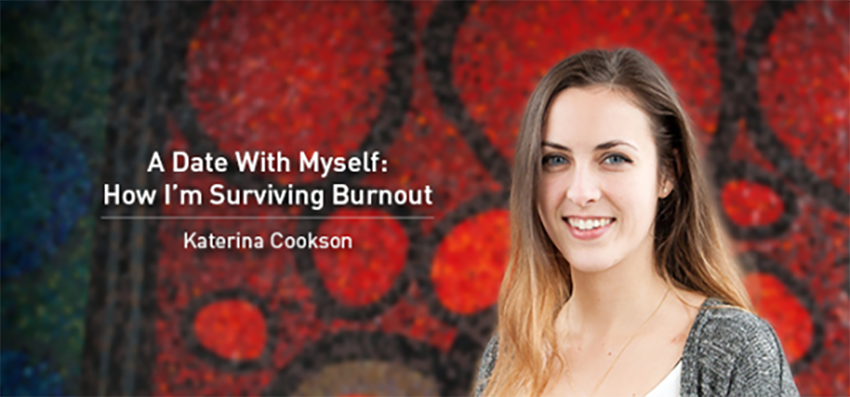
Over the summer, I read a book called “ELON MUSK”. Aptly named, it was the biography of one particularly crazy billionaire entrepreneur and his little start-up: an electric-car company called Tesla now worth over $30 billion. Maybe you’ve heard of it?
After finishing that book, all I could see myself doing in the future was joining a start-up like Tesla. It was cool, it was exciting, it was emotionally and intellectually stimulating. It never got boring. You worked crazy hours and sacrificed a personal life, sure, but it was worth it.

But… now that I’m five months into an eight-month office-based co-op at SFU, my values have changed. A lot.
This epiphany occurred during a recent meeting with one of my supervisors. We’d finished up the work business, and I could sense a check-in coming.
“So, Kat,” she said. “How’s the co-op going so far?”
Too quickly, I let out a cheery, “Good!”
A moment passed.
“Well, actually…”
Okay, I broke down. I was embarrassed by the fact that I was in tears, but it’s a credit to Deanne that I felt safe enough in her presence to show a very vulnerable side of myself.
The point is, Deanne had asked me a question I hadn’t even thought to ask myself. I was hit smack in the face with that realization that, for the past few months, I’d let myself get stuck in a dreary after-work routine. Every day, I’d:
-
Bus home
-
Eat dinner
-
Watch The Office for two hours
-
Sleep

The burnout, a silent and stealthy killer, had crept up on me. As much as I love the diverse work that I do with SFU Career & Volunteer Services, I’d let it take over my personal life. I’d let myself become estranged from creative hobbies like art and personal writing that gave me a vital emotional outlet. And I think I’m not the only student who has felt this way.
There was five more months in my co-op to go. This couldn’t continue. So I began to take action by injecting a little self-care into my workday: ditching the seated meetings with one of my supervisors, and instead holding them while walking SFU’s trails. Setting up plants on my desk. Drinking more water. Forcing myself to stretch my legs every hour. Doing some research into the First Nations medicine wheel (part of my job portfolio), and learning about the significance that Indigenous people attach to the four realms of balance in ones’ life: physical, emotional, intellectual, and spiritual.
And what about outside of work? A while back, I did an informational interview with a Communications alumnus who has a PR job arguably as stressful as any of Tesla’s positions. She gave me a piece of advice that stuck with me: “An appointment with yourself is as important as any work appointment”.
So it wasn’t meditation, yoga, or a spiritual retreat that helped knock some sense into the way I was prioritizing things. It was something as un-glamorous as time-management. A date with myself after work – an hour to paint, an hour to create something from Pinterest, an hour to write a letter to a friend abroad – was more important than wallowing in the stress of my workday and watching The Office, even though the latter is certainly easier.

Not everyone is fortunate enough to have supervisors that care so much about their well-being (shout-out to Deanne, Albert, and Jo-Anne). Here’s a quick note to supervisors who might be reading: please look after your co-op student. Take the time to ask them how their workload is. And above all, let them know that their mental well-being is important to you, and that it has just as much value as the work they’re doing for you – trust me, they’ll appreciate it, and you’ll end up with a happier, more motivated employee.
And students, if you’ve felt like this too, know that you can take action to control your stress when you’re overwhelmed by work. Some suggestions:
-
Exercise (never tried it, but I hear it works).
-
Make an effort to see your friends at least once a week, no matter how tired you are.
-
Refuse to open your work email on the weekend – don’t do it! Just don’t!!
-
Remember that nothing is life or death.
-
If you’ve got to work overtime to finish something that’s stressing you out, don’t feel guilty about it.
-
Never sacrifice sleep - here’s an article that I hope convinces you why.
So, that glamourous, go-go-go, Tesla-esque start-up life that I was so enamoured with before?
Well, let’s just say that if in the distant future I ever do find myself in an interview with Elon Musk, there are a few questions I’ll need to ask him before I accept his very gracious job offer.
Mr. Musk, how does your organization prioritize employee well-being? What’s the culture around the work-home division here? And, How do you support and motivate your team?
If any of this article rings true to you, maybe you might want to consider asking these in your next interview, too.














